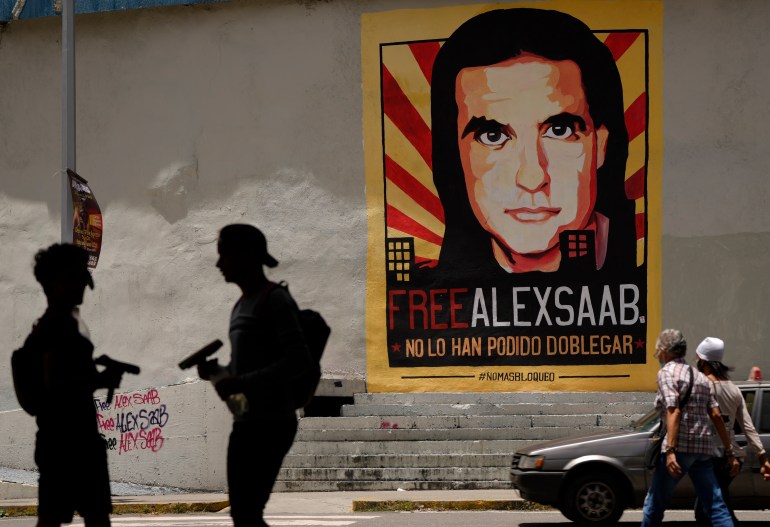Alex Saab pleads not guilty in high profile corruption court case
Saab is accused of paying bribes to siphon $350m from state contracts to build housing for Venezuela’s government.

Alex Saab, a businessman accused of laundering millions on behalf of the Venezuelan government, pleaded not guilty in a federal court in the United States in a case that has strained relations between the two countries.
Dressed in a beige jumpsuit, Saab was tethered by the legs to five other inmates on Monday as he entered the courtroom in Miami for his arraignment.
Keep reading
list of 3 itemsIran, Venezuela to sign 20-year cooperation accord
Judge sets arraignment for Venezuelan accused of money laundering
Saab, 49, is accused of paying bribes to siphon off $350m from state contracts to build housing for Venezuela’s government. After seven charges were dismissed, he now faces a single count of conspiracy to commit money laundering – punishable by up to 20 years in prison — the maximum allowed by Cape Verde when it agreed to extradite Saab to the US last month.
Venezuela has launched an all-out diplomatic offensive involving allies Russia and Cuba to come to Saab’s defence, arguing that the Colombian-born businessman was a diplomat on a special humanitarian mission to Iran when his plane was detained during a refuelling stop on the African archipelago.

His lawyer, Neil Schuster, addressed the court as a representative for the “Diplomat of the Bolivarian Republic of Venezuela” and then entered a not guilty plea. A small group of supporters of Venezuela’s government shouted “Free, free Alex Saab” outside the court during the proceedings.
“He was chased down, kidnapped and tortured for helping Venezuela,” Venezuelan President Nicolas Maduro said at a book fair this month in Caracas where he presented alongside Saab’s Italian wife a collection of letters Saab purportedly wrote while detained in Cape Verde on a US warrant.
Maduro’s allies have characterised the pursuit of Saab as part of an “economic war” on Venezuela being waged by the US government. The case has strained already frayed relations between the US and Venezuela.
But new court filings in a related case indicate that Saab, despite his portrayal as an anti-imperial revolutionary, may have been secretly betraying Venezuela’s government to US officials for years.
The bombshell revelation was contained in a sentencing memo by attorneys for a University of Miami professor, Bruce Bagley, who Saab hired to assist with his son’s visa application and then used as a channel to make payments to attorneys helping him reach out to US federal investigators.
Saab, through a lawyer, has said all of his activities had the blessing of Maduro’s government and at all times, he’s been a “loyal citizen” of Venezuela.
Venezuela considers Saab the keeper of state secrets and has said any attempts to extract a confession could compromise Venezuela’s national security.
But it is unclear what leverage the Venezuelans have in preventing Saab from cooperating with federal investigators in exchange for a lighter sentence.
Just as Saab was being transported to the US on a Department of Justice plane, Maduro’s government suspended negotiations in Mexico with Venezuela’s US-backed opposition, accusing the Biden administration of seeking to sabotage the talks.
Maduro’s government also threw back into jail six American oil executives it accuses of corruption. They had been under house arrest in another politically-charged case marked by allegations of wrongful detention. They have been granted a rare appeal and are expected to appear in a Venezuelan court on Tuesday.

Meanwhile, the US continues to assert pressure on Saab.
Shortly after his arrival to the US, prosecutors in Miami unsealed a new indictment accusing his longtime business partner, fellow Colombian Alvaro Pulido, of creating a network of shell companies spanning the globe — Turkey, Hong Kong, Mexico and the United Arab Emirates — to hide windfall profits and bribe payments tied to overvalued food contracts. Saab himself was sanctioned in 2019 for his role in the same alleged kickbacks scheme.
But Saab’s importance to Maduro’s government ran much deeper.
As the US ratcheted up sanctions on Venezuela, he is believed to have emerged as the government’s main fixer with the international connections to circumvent the US restrictions. His trip to Iran, described as a humanitarian mission by Maduro, was aimed at securing deals to sell the country’s crude oil in exchange for much-needed fuel and other goods.